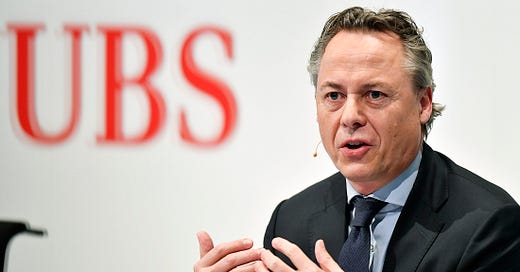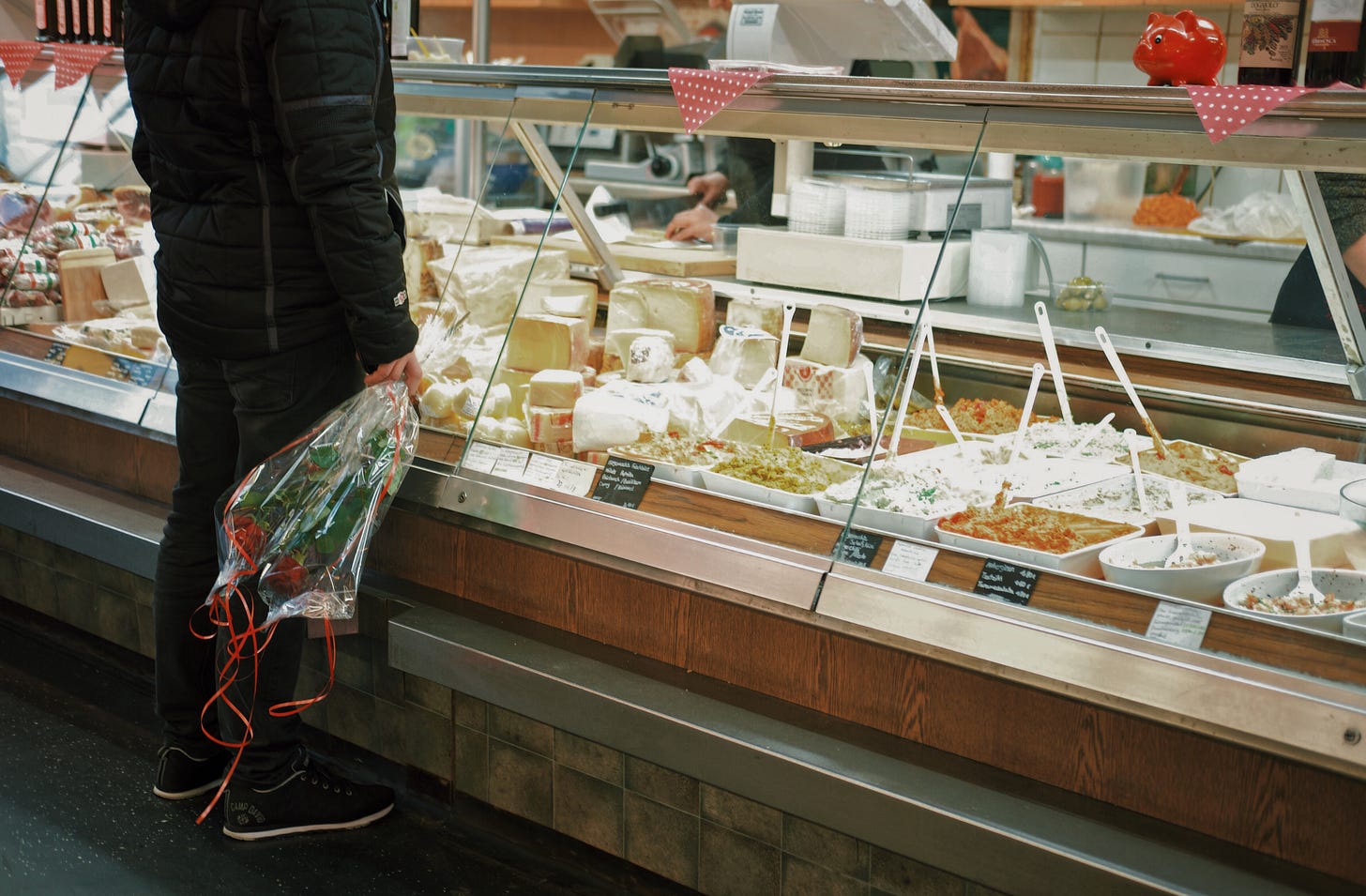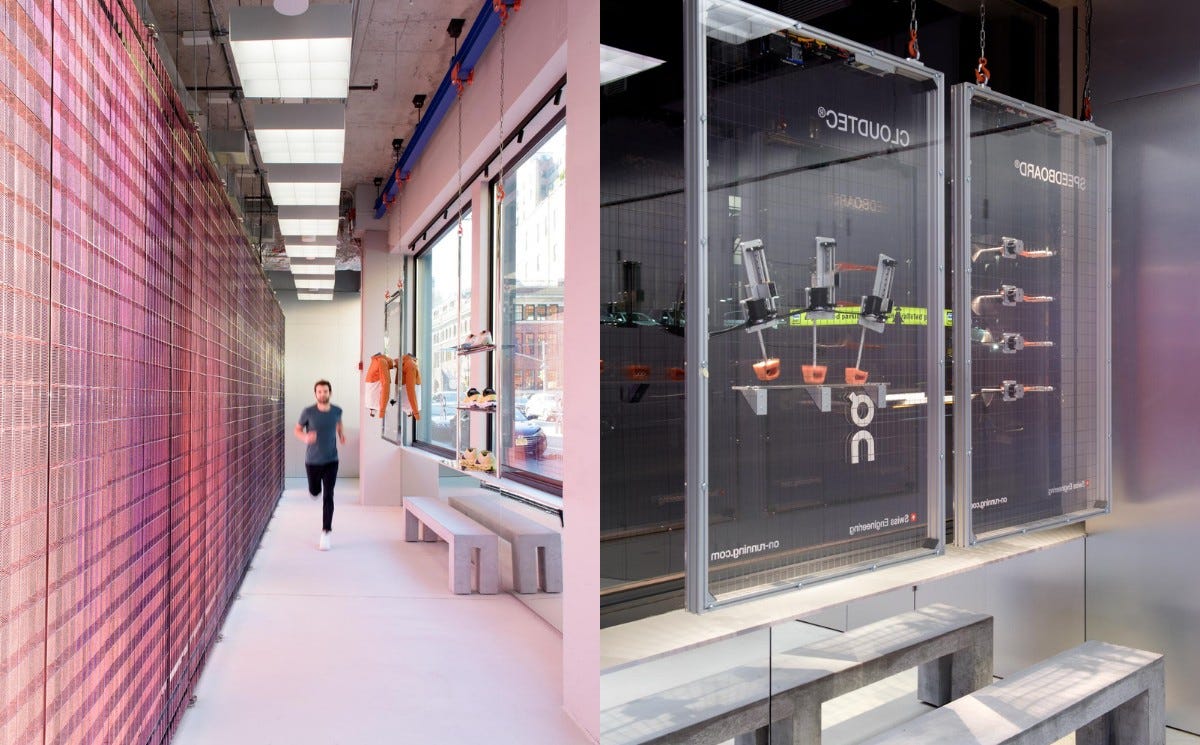Dear Insider,
Each edition of The Swiss Insider includes some of the most interesting numbers from the Swiss economy.
In this double issue there are a few more than usual…and one particularly notable set of statistics, compiled by The Financial Times after UBS CEO Ralph Hamers’s recent Q&A session with analysts.
The Dutchman now in charge of the world’s largest wealth manager mentioned the word “digitalization” 13 times, together with 17 references to “technology”.
Surprised?
Some might have been, given that Sergio Ermotti, Hamers’s predecessor used the terms nearly 4 times less over his last three quarterly presentations.
But while most keen observers of the CEO change at UBS did expect a greater emphasis on IT and digitalization, they may have been slightly shocked at the abundance of reference to the tech topic so early in Hamers’s reign - included a pointed reference to using AI to better serve wealth management clients.
One conclusion that can be drawn is that, while UBS has certainly not ignored technological advances in the past, it now feels a renewed need to push the subject. And - maybe not surprisingly - was not able to do so as long as the company was headed by a cautious Swiss CEO.
Now expectations are high for his replacement. It is most obviously time to “get on with IT.”
For more about the “on” part - see this week’s Profile section… 😉
The Briefing
Burning news from around Switzerland - bit by bit…
Going for Green
If some in the Swiss financial services industry have their way, the country may soon be known for more than chocolate, cheese and colossal overseas wealth. The Swiss Exchange SIX is launching a new sustainability focused market index for Swiss companies. Of the 200 firms making up the current SMI, around 70 have been excluded from the new index. Who is a fan of the new trend? BlackRock, he world’s largest asset manager, and its Swiss CEO Mirjam Staub-Bisang for one.
What it means: With its close association with nature and natural beauty, it is no surprise that Switzerland would have a ‘natural interest’ in promoting itself as a world leader in sustainability and climate friendly finance. More problems arise, however, when these ambitions meet the reality of the country’s role as a hub for multi-nationals whose business interests don’t always inspire them to ‘do the right thing.’ However, with such a concentration of wealth and financial clout, both from companies like BlackRock and private banks such as Pictet, such a ‘first-mover’ step may well get the ball rolling and push other, more reluctant companies forward, whether they like it or not.
Taking (Away) the Credit
Back when things were good and the world was blissfully (and mostly willingly) ignorant of big scandals at big Swiss banks, Patrice Lescaudron seemed to have it good. After it was discovered that he stole millions from top Credit Suisse clients, he ended up being convicted and committed suicide. Now newly revealed evidence suggests that his bosses at the big bank knew about it and did not take much action.
What it means: Not much more can be said to this continuation of the ongoing saga of Credit Suisse and others in the Swiss finance industry. What remains to be seen is how long these stories can continue until they cause a larger, more seismic shift in the industry as a whole - or whether they eventually deepen the disenchantment of private clients with institutions which pretend to serve them.
Cheap the cheese
The second “C” word - cheese - has a special place in Swiss culture and the Swiss economy. (Chocolate being the first and undisputed winner…) As one of its largest exports, the food staple also serves as a long-standing ambassador for the Swiss national brand, with its emphasis on quality and variety. The latest statistics show that that trend has continued, rising over 3% year on year. But the numbers also reveal a curiosity: thanks to the border closings resulting from the coronavirus pandemic, a large amount of cheaper cheese was also imported into the country - a whopping 11.7%.
What it means: There is little risk of the Swiss turning their backs on homegrown products, especially not local brands. But the scale of import shows to what extent those living close to Switzerland’s borders have gotten used to getting their groceries, including their weekly cheese allowance, where it is cheaper - in Germany, Austria or France. While it is too early to tell, a sustained trend in cheap cheese imports may eventually lead to a change in taste and undermine local producers….eventually.
A Little Dose of ‘Why not?’
While its reputation among the world’s wealthy takes a hit, Credit Suisse is moving on the offensive in other areas. Its ‘digital bank’ app CSX was rolled out to much fanfare (and some derision) last year. Now the big bank is targeting entrepreneurs with a new media campaign labeled ‘Why Not?’ The mix of TV and print ads seeks to extend a helping hand to enterprising young people (and potentially some of those hit by job cuts at big banks…ahem…). One example of its spots is featured below.
What it means: All irony aside, the coronavirus pandemic has seen a record number of new companies founded in Switzerland. The times - no surprise - are ‘a-changing’… As one of the largest banks in a semi-secluded home market and itself the offspring of Alfred Escher’s entrepreneurial drive, Credit Suisse is right to aim its efforts at small and medium businesses…and new ones in particular. Recent reports that CS bungled the potential business of Swiss e-commerce millionaire Roland Brack only strengthen the need for Thomas Gottstein to do things right on the homefront.
Digital kick in the pants
In some cases, digitalization creeps in from the bottom up. Workplace messaging app Slack serves as such an example. The question of whether the message gets to the top (no pun intended), however, often remains open. In the case of Julius Bär CEO Philipp Rickenbacher, it did. Speaking in a recent interview with SRF, the top exec made it clear that covid-19 has been a kick in the pants to move firms like his towards digitalization - in communication, but not only.
What it means: Rickenbacher came onboard at JB as a bit of an outsider and certainly as a surprise candidate for the top job. His first moves towards cuts and restructuring (supported by external McKinseyites) didn’t win him any friends. But embracing the current trend and the acknowledgement that digitalization is essential will be less controversial - and potentially help position Switzerland’s 3rd largest bank as a ‘first mover’…
Feeling smarter (already)?
Let others know about The Swiss Insider…they’ll thank you. 😀
By the Numbers
Numbers that matter…
88 basis points
Like most banks with a global scale, Julius Bär has done well for itself during the pandemic. 2020 numbers show the Zürich-based wealth manager has upped its gross margin to a full 88 basis points. Its share price has also come along nicely, moving up 12% over the past year. Now the maybe the cost-cutting programs will start to make a difference…
100 000
One of the world’s biggest pharma companies just keeps on growing. And this time the focus isn’t necessarily on profits, although those have also gone up (not surprisingly…). The Swiss giant now boasts over 100 000 employees - a hefty number the matches the oversized expectations of healthcare and medical companies these days… Of note: that six-digit number includes significantly more researchers than sales persons - perhaps reflecting the reality that visiting doctors’ offices to sell drugs isn’t slightly out of fashion these days.
600 million CHF
Long and hard has been the road, but after more than 13 years, another unpleasant chapter in Credit Suisse history is coming to an end. The Swiss bank this past week came to an agreement to pay 600 million CHF to MBIA, a financial services company listed in the US, as part of a settlement to a lawsuit resulting from Credit Suisse’s sale of mortgage-backed securities prior to the financial crisis in 2008.
15.1 billion CHF
Okay - so the numbers for Roche’s 2020 balance sheet are also worth a mention. And they are big - 15.1 billion Swiss francs. Even with a 5% drop in overall revenue (to CHF 58.3 billion), the top-flight firm managed to up its profit by more than CHF 1 billion. Not bad, not bad….maybe the pandemic should stick around longer…?
400 000 CHF
Technical problems are nothing new - but for some they are more costly. According to some estimates raised by employees of Swiss radio and television service SRF, technical delays and insufficient infrastructure are costing the media group up to CHF 400 000 per month. Obviously, such wastefulness makes personnel layoffs in the meantime harder to justify.
The Profile -
An in-depth look at singular personalities from Switzerland. This week the focus is on David Allemann, CEO of Swiss shoemaker On, one of the most exciting (and profitable) brands in the country.
Few Swiss firms have enjoyed as much unexpected success in recent years as On - the swank shoe and athletic apparel brand that counts Roger Federer as investor and world-class brand ambassador.
Maybe it’s the viral, word-of-mouth marketing, maybe its the funky looking soles of the light, brightly colored slip-on shoes that pair so nicely with other luxury leisureware - whatever it is, On has achieved a level of fame for itself that is much bigger and broader than the two letters that make up its brand name.
The main man behind it all is David Allemann.
Together with co-founder and former duathlon world champion Olivier Bernhard, Allemann has done something that few Swiss entrepreneurs have managed in recent memory - create an exciting, hip global company that boasts the distinction of being the fastest-growing running shoe brand worldwide.
On the road to today’s success, Allemann credits a great product (of course) - and early recognition with a Brandnew Award at the ISPO trade show - with spurring him and the founding team onto success.
On isn’t, however, Allemann’s first dance in the world of brand building. Before kicking things off with Bernhard and their 3rd co-founder, Casper Coppetti, Allemann helped advise startups with McKinsey and led ad agency Advico, Young and Rubicam.
Perhaps it is this experience, combined with the resolute assurance that comes from offering a quality, Swiss-designed product that has helped Allemann and team capture 40% of the running shoe market in Switzerland.
And yet, the success of On, together with its co-founders and now superstar promoter Federer, offers another perspective on what makes Switzerland tick. Experience, teamwork, quality - all these attributes have been long associated with the Alpine country.
Now, however, On is aiming even higher. Just before Christmas this past year, On opened its first flagship store on 363 Lafayette Street in New York City - a bold move for a shoe brand in the middle of a global pandemic.
Or maybe the move is proof that even from the vantage point of a small home market, entrepreneurs like Allemann have the capacity to think big - and strategically.
After all, what do people want most after months of being locked up at home during a pandemic? The chance to “get out” and “get on” (pun intended) with life.
In any case, Allemann and On have set themselves on a course to take on some of the giants of the industry. With only 400 employees (compared to over 76 000 for industry leader Nike) it might seem like a daunting task.
But then again - why not?
Go big or go home.









